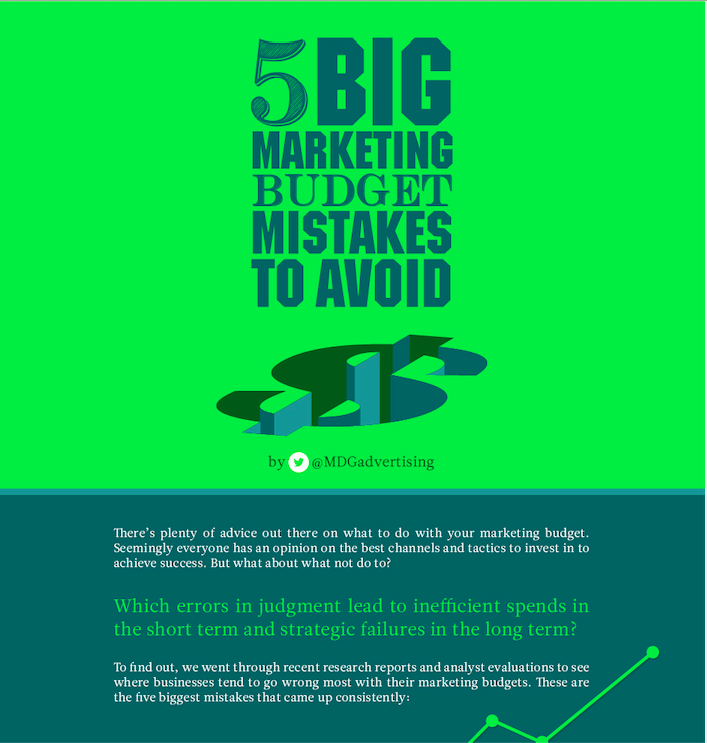
Chances are, you’ve already set aside or thought up a budget for your marketing expenses. Common sense right? You don’t want to blow all of your money on one aspect of your business.
Unfortunately, this area of business almost always gets underfunded. And as Jeff Desjardins points out, “as a result it ultimately ends up being a numbers game: did the marketing team generate sufficient ROI with the restricted amount of money they had? And if you could re-allocate those resources in a particular way, could they have gotten the company more bang for the buck?”
Even if you don’t have a marketing team and you’re doing this by hand, it’s important to make sure that you have enough money set aside for marketing purposes.
Maximizing a budget for ROI
Setting aside a budget for ROI (Return On Investment) seems pretty obvious and straightforward. You want to spend enough to get attention and clients, but you don’t want to overspend. It’s a tricky balance, but as I mentioned it seems like a pretty simple thing to figure out.
Unfortunately, ROI is definitely a subjective term in the marketing world. Desjardins notes that “no one agrees what it means, how to measure it, how to develop a strategic plan around it, or what tactics to use.” Yikes. So how do you know how much to spend if nobody can agree what works the best? How do you maximize your ROI if people can’t even come to a basic agreement of what the term even means?
Not surprisingly, this is where a lot of marketing mistakes take place. This ambiguous kind of gray area becomes a pitfall. So how do you avoid it?
Well, let’s a take a look at the MDG Advertising infographic. It looks deep into the world of marketing budgeting and focuses on some of the most common mistakes.
#1 Beginning with Bad Data
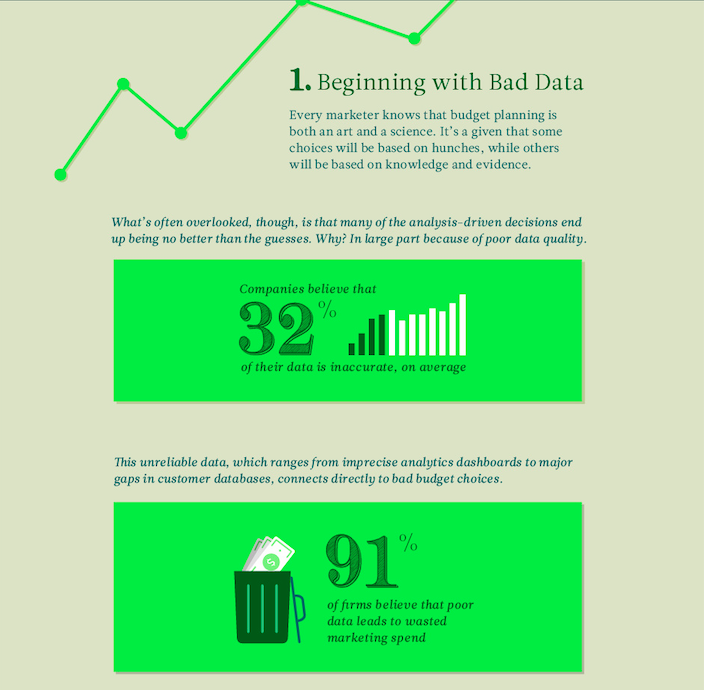
Budget planning is one of those fickle things that requires a lot of intuition. Most of what you do will be based on that “gut feeling” as well as what worked previously.
*Though each project is different; what worked great for one might flop for the other.
So in short, a lot of your analysis planning becomes guesswork. Not necessarily the worst thing in the world, but definitely not the greatest asset for your business either. But what’s to really blame here? Well, many suggest that it’s actually bad data quality that’s to blame.
Companies believe that 32% of their data is inaccurate on average.
That’s a staggering chunk of data that isn’t reliable. What makes up this data? It ranges from:
- Analytics dashboards that are fudging numbers/not reporting accurately.
- Significant gaps in customer databases.
Thus, you’re led down a path that delivers you directly to poor budgeting choices’ door. Unsurprisingly, 91% of firms believe that this poor data leads to wasted market spending.
And it makes sense. If you’re working with bad data and spending based on it, then you’re probably wasting a lot of dollars.

So what can you do exactly to combat this? Well, unfortunately in a lot of ways it’s going to be trial and error. But to maximize your chances of avoiding the pitfalls, check and double check your data. Reach out to others in the field who are successful. Check blogs for advice. Take advantage of Facebook groups. And at the end of the day, trust your gut instinct.
#2 Failing to Coordinate with Sales
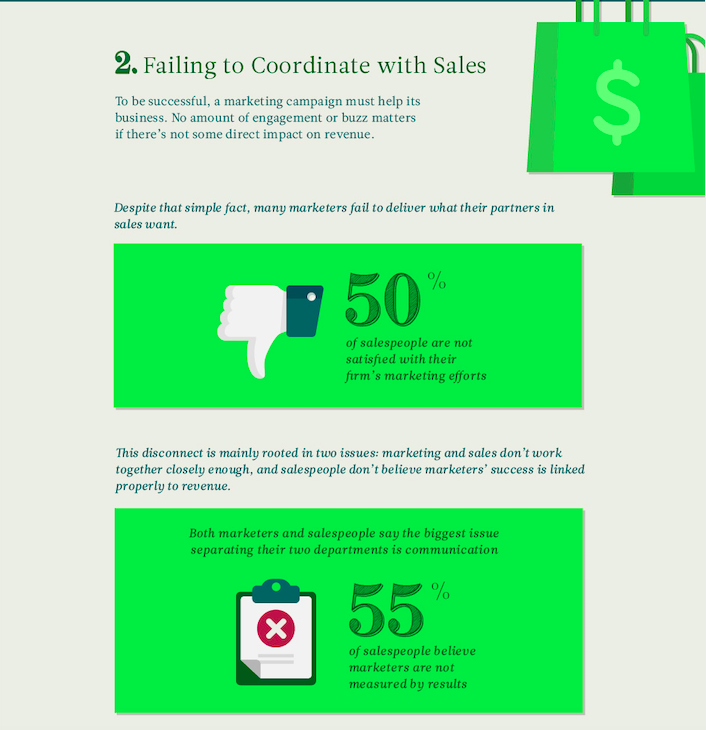
Your success is ultimately dependent upon your marketing campaign. If you have a weak or lackluster marketing campaign, your business (and your bank account) are going to pay the price. No matter how much engagement you achieve or your social media presence will matter if there’s not some direct impact on revenue. In short, you can have 40k Instagram followers who like/comment on all of your posts but it doesn’t really matter unless they’re spending or getting others to spend.
Assuming you’ve got a sales department to handle this, keep in mind that 50% of sales people are unhappy with their firm’s marketing habits.
This usually occurs because there’s a disconnect between the marketing and sales departments. These two should be intimately linked and working close together. If they’re not, as the South Park meme goes:

If you’re managing both sides on your own, you’re far less likely to have this disconnect but it can still occur. You need to pay attention to all aspects of your business and invest in each part fairly. If you’re focused too much on your sales, then your marketing is going to slip… And ultimately, your sales will follow. The opposite is true as well.

#3 Underinvesting in Workhorses that have Proven Their Worth
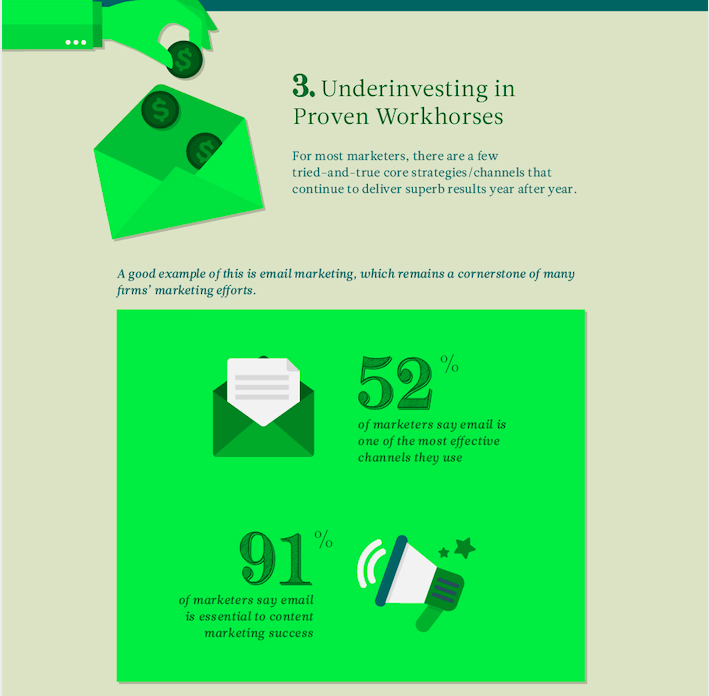
Almost every marketer out there has their “bread and butter”. What I’m referring to is tried and true strategies, channels, platforms, etc. that have continued to deliver superb results year after year. For some marketers, LinkedIn is the way to go. Every time they visit the platform regardless of what the business is about, they get results. It’s proven its worth time and time again.
Many swear by email marketing. In fact, 52% of marketers say email is one of the most effective channels they use.
91% of marketers say email is essential to content marketing success.
So where’s the issue?
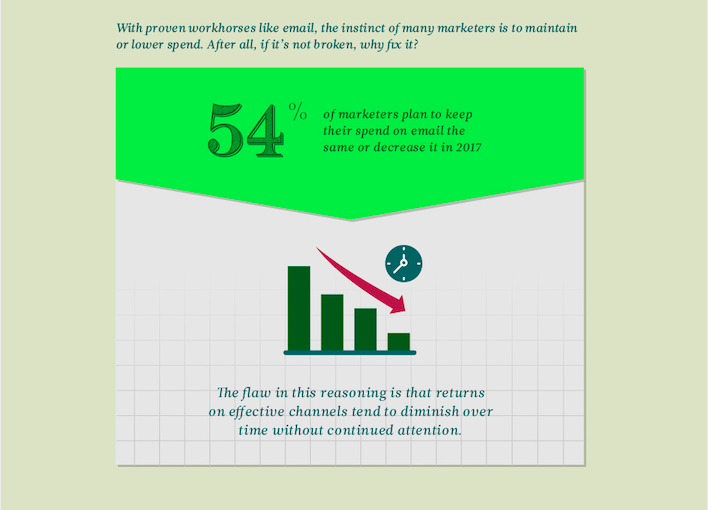
When looking at proven workhorses, many marketers maintain or even lower their spending on these platforms/strats. After all, if it’s working so great on its own, why change that? If it’s not broke, don’t fix it.
Well, this is one of those rare areas where that quote doesn’t pay off (literally). “Returns on effective channels tend to diminish over time without continued attention.” Just like a work horse in real life, it’s not going to be in the best shape possible or be able to work properly if it’s not being cared for and groomed. Think of your platforms the same way. If they’re performing for you, give them the attention they deserve. Keep grooming them.

#4 Underestimating the Speed of Change
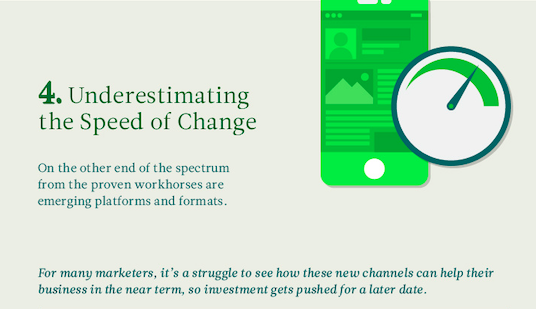
This is also where things get tricky. While you definitely want to pay attention to your proven workhorses, you don’t want to neglect new avenues and platforms. Technology is always changing! New and exciting things are released each and every day it seems. And while it can be tempting to just keep grooming your workhorse, it’s also important to explore these other avenues. Keep in mind that at some point, your workhorse might be replaced by one of these new platforms and if you haven’t invested at least a bit of time into it, you’re going to be left behind.
This isn’t to say that you should neglect those that are paying your bills, but make sure you’re expanding your horizons and trying new things too!
“For many marketers, it’s a struggle to see how these new channels can help their business in the near term, so investment gets pushed for a later date.”
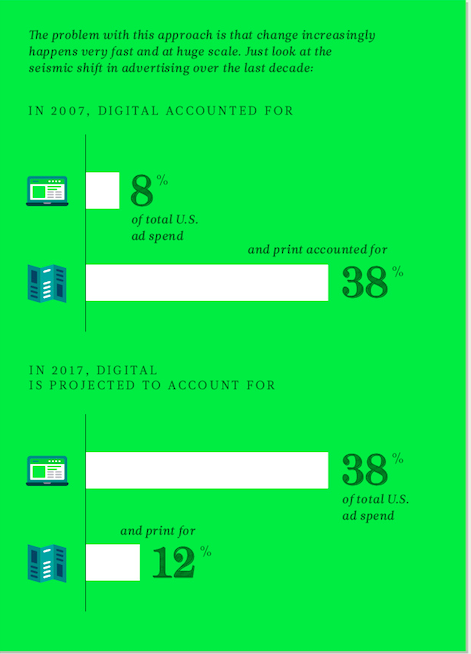
The infographic above is pretty self- explanatory as to why you shouldn’t push off new platforms in favor of spending time with your workhorses.
But once again, things shift and when they do they shift fast. So make sure that you’re also leaving some wiggle room to explore new avenues. You never know what’s going to be the “next big thing” and you want to make sure you’re on board when/if it hits.

There are also a number of fresh technologies that could see rapid increases in the coming years:
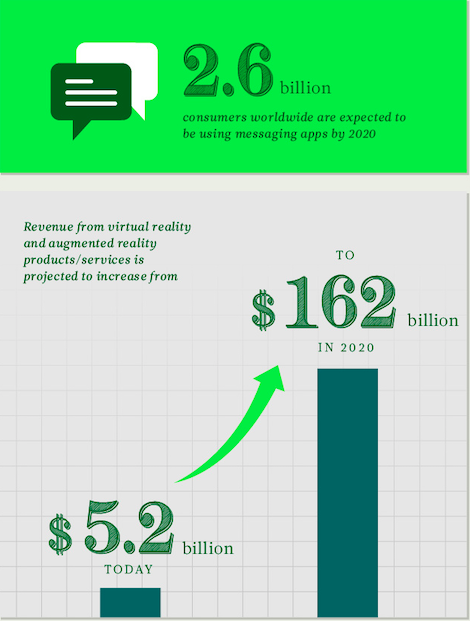
#5 Evaluating Too Little, Too Infrequently
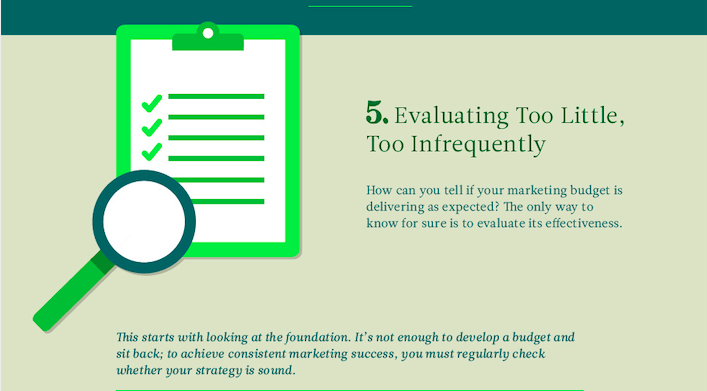
But how can you tell exactly if your marketing budget is delivering as expected?
This is where one of the biggest pitfalls in marketing budgeting lies: evaluating too little, too infrequently.
For a lot of businesses, they have X amount of clients or X amount of money in mind that they want to make. If they’re reaching those goals or coming close, they’re typically content to assume that their marketing budget is paying off. And for the most part, they’re right. After all, they’re reaching their goals so it must be working.
However, your marketing budget could almost always perform better.

So don’t sit back so content with your results that you neglect evaluating your business. Or that you push it off. “I’m getting results, why check?” Honestly, you should be checking pretty compulsively.
Where to start?
The foundation. It’s great that you developed a budget but it’s not enough. You and your business won’t benefit from you sitting back and coasting. You need to regularly evaluate and check your strategies. Are they performing to the best of their ability? Can you do more? Are certain areas tanking that were performing well?
“Evaluation however doesn’t just apply to strategy. To make the most of your marketing spend, you need to monitor and test execution. Unfortunately, many businesses fail to do this.”
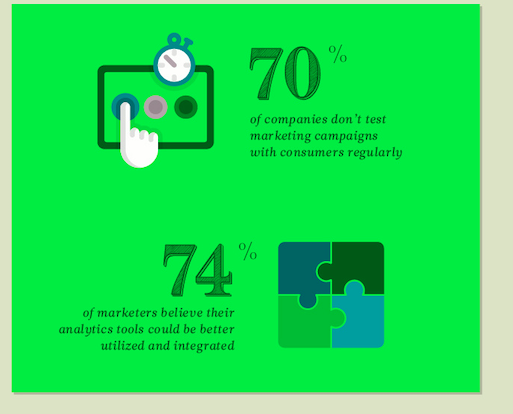
With all of this in mind, it’s important to spend some time checking and re-checking your marketing strategy. Yes, it costs money and yes it takes time away from you, but honestly the pay off is well worth giving up a few hours of your time or spending that extra cash. Your business will benefit from the attention and investments you make. So don’t neglect it!

Thanks to Jeff Desjardins at https://www.visualcapitalist.com for the graphics and info!


















